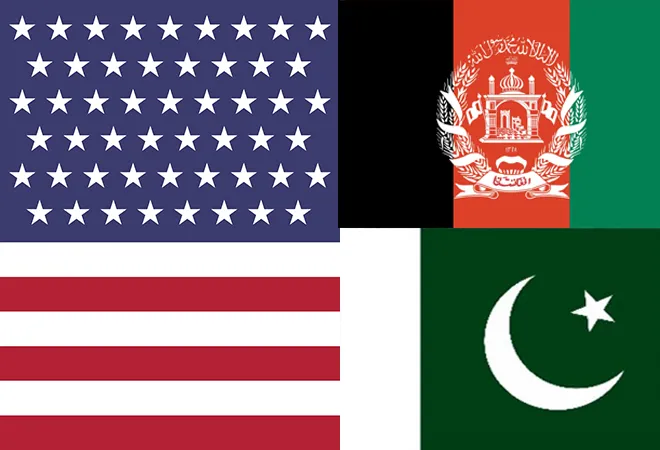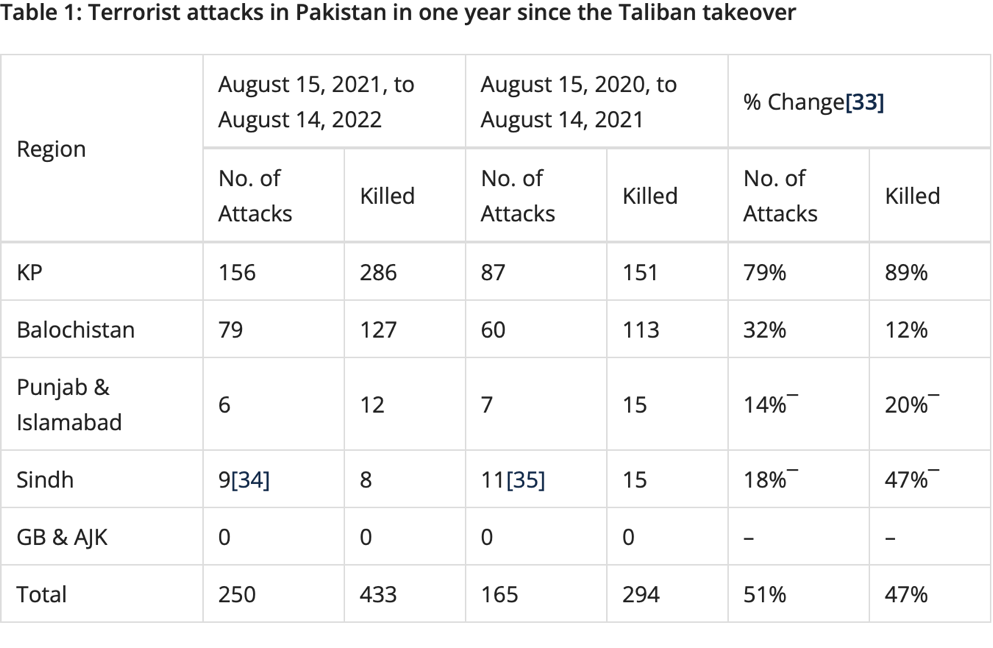
In a recent interview, the United States Special Representative for Afghanistan, Thomas West, rejected any possibility of a Pakistani hand in facilitating talks between the Interim Taliban Administration and Washington. Restating that the US is engaging pragmatically with the Taliban to secure the rights of the Afghan people, he evaded the question on needing Pakistani airspace for carrying out operations inside Afghanistan, stressing instead on the ‘reorganisation of its capabilities’ in the region. This rather terse denial of any need for Pakistani cooperation in managing the situation signifies the incongruity in Islamabad’s relationship with the US and Afghanistan post August 2021.
The security and military establishment was chuffed to see the exit of the US from their neighbourhood and its replacement with a friendly Taliban regime.
In the immediate aftermath of the fall of Kabul, there was a sense of victory in Pakistan. The security and military establishment was chuffed to see the exit of the US from their neighbourhood and its replacement with a friendly Taliban regime. But the past year has acquainted the Pakistanis with the adverse spillover effects of a resurgent Taliban government in Afghanistan. Reeling under multiple crises—an existential economic catastrophe compounded by the political instability fuelled by the intransigence of Imran Khan—the precarious relationship with Kabul and a tense relationship with the US makes the situation extremely complex for Islamabad. Even though the public rhetoric on its ties with the US has oscillated between stagnation to a complete reset of the relationship since Khan’s ouster, the reality in Afghanistan necessitates the urgent need for cooperation between the two.
A bittersweet victory
As per a latest report of the Pakistan Institute for Peace Studies, Pakistan saw a 51 percent increase in terrorist attacks inside its territory since the fall of Kabul. This significant jump from the same period last year points to a fast-deteriorating security situation in the country. There is a sombre realisation that the ‘mindless jubilation’ over the victory of the Taliban did not herald a new beginning for the state of the bilateral relationship or infuse new momentum in improving the security situation in the neighbourhood. Pakistan’s aspiration of reaping the benefits of a post-US reality in Afghanistan has come to naught.

Two major sources of contention between the neighbours, which have flared up in the past year, are the revival of the Tehreek-i-Taliban Pakistan (TTP) and the Taliban’s refusal to accept the Durand Line as the international border. Both these issues have resulted in a trust deficit and sowed the seeds of a deeper and more entrenched estrangement between the two sides. The TTP, taking advantage of its improved political status, has continued its attacks inside Pakistan. While the Pakistani leadership was confident of having secured the Taliban’s support in reining in the group, the latter has failed in using its leverage over the group to curtail their actions. The group is targeting political opponents, security forces, and Chinese interests in the country, with attacks on Chinese workers and infrastructure projects increasing. Pakistan’s attempts at fencing the border and erecting military posts are being resisted and retaliated by Afghanistan. For the Taliban, the Durand Line dispute is a necessary tool for gaining a degree of legitimacy and for mobilising a favourable public opinion. The TTP is also a source of influence for them over Pakistan and a means for it to project itself as an arbiter between the two. The skirmishes, on top of the terrorist attacks inside Pakistan, have deteriorated the security situation in the Af-Pak border region. The US has also expressed concern at the challenges faced by Pakistan because of the growing attacks.
In a bid to mitigate the threat from the militants, Pakistan conducted airstrikes inside the Afghan provinces of Khost and Kunar in April. While not acknowledging it officially, the strikes were intended to send a message to the Taliban and raise the cost of their support to the TTP. Although they were unsuccessful in stopping the TTP, the strikes led to a public outcry over the killing of 45 civilians, half of them children. It also increased the tempo of voices on both sides, with Pakistan chiding Afghanistan for allowing attacks from its territory and the latter submitting a demarche to Islamabad for breaching its sovereignty.
The group is targeting political opponents, security forces, and Chinese interests in the country, with attacks on Chinese workers and infrastructure projects increasing.
The killing of Ayman al-Zawahiri on 31 July by a US drone strike in Kabul further dealt a blow to the bilateral relationship. The presence of the Al-Qaeda leader in a house owned by Sirajuddin Haqqani did raise concerns about a violation of the Doha agreements, which committed the Taliban to stopping its support of terrorism. The Taliban leadership mounted public criticism of Pakistan for allowing its airspace to be used by the US. The Interior Minister, Sher Mohammad Abbas Stanekzai, blamed Pakistan for exploiting their economic situation and for taking money in return for giving operational access to the US. The over the horizon attack happened despite a consistent denial from the Pakistani side against granting the US or other countries access to its airspace.
Washington’s role in the region post takeover
During his visit to the US in September this year, the Pakistani Foreign Minister expressed satisfaction at the state of the US-Pakistan relationship. Relinquishing the baggage of viewing it in tandem with the situation in Afghanistan, he showed optimism about expanding their cooperation, particularly in geoeconomics, which is now the key word in Islamabad’s foreign policy circles. But for Washington, the process of dehyphenation is still incomplete. Post-August 2021, officials in the US made about a reassessment of their relationship with Pakistan and understanding its role in the rise of the Taliban. These statements irked Islamabad who demanded an acknowledgement of its sacrifices in the war on terror and its contribution to the peace process. The relationship was dented further due to Imran Khan’s anti-US rhetoric in his scramble for power. As Prime Minister, Khan rejoiced the coming of the Taliban, deeming it as the moment when their neighbour freed itself from the ‘shackles of slavery’ and entered a new dawn of freedom. His expressions of support after that sought to downplay the rigid policies of the group, trying hard to give it the benefit of the doubt and encouraging the international community to do so as well. He also lambasted the US for the failure of its war on terror and for orchestrating his removal from office.
Relinquishing the baggage of viewing it in tandem with the situation in Afghanistan, he showed optimism about expanding their cooperation, particularly in geoeconomics, which is now the key word in Islamabad’s foreign policy circles.
To salvage the harm done by this anti-US rhetoric, the Sharif government undertook an intensive courting of their American counterparts. The approval of a US $450 million maintenance package for the F-16 did signal a thaw, but President Biden’s remarks on the dangerous nature of the Pakistani state and the US envoy’s reluctance to acknowledge Islamabad’s role in managing the situation in Kabul pointed otherwise. Notwithstanding these concerns, the ties between the two will be defined by the reality of an ascendant Taliban in the medium term and the threat posed by it and other terrorist groups, for which Washington will need Pakistan’s support.
A potential rupture in ties?
The Sharif administration, while refraining from directly calling for the Taliban’s recognition, has insisted on giving them more political space and time, emphasising on building their capacity before passing a verdict on whether they have demonstrated a will to initiate reforms. The leaders urged the international community to not overlook the difficulties that the Afghan financial institutions are facing over their concern for the security situation. Even with the onslaught of the TTP and the failure of the talks mediated by the Taliban, there is no public acceptance of a major breach in the relationship.
The spokesperson for the Taliban recently reassured the Pakistani authorities that Afghan soil would not be used to orchestrate attacks in Pakistan, and anyone found doing that would be charged with treason. He also reiterated their inability to control areas along the border, where they have little to no access, owing to which some groups might be taking advantage of their lack of presence. When the Pakistani PM pointed out the presence of terrorist groups inside Afghanistan, he received a harsh response from the Taliban. The Pakistan Foreign Office clarified that any criticism levied on the administration should not be taken as a sign of enmity. To assuage the outburst, Pakistan also committed to expediting the visas of Afghan nationals and providing them scholarships.
The leaders urged the international community to not overlook the difficulties that the Afghan financial institutions are facing over their concern for the security situation.
While the constant brick batting over interference in domestic affairs or using the other as a scapegoat for its troubles will not cease in the near future, the indispensability of the support that both countries need from each other is not hard to miss. For Pakistan, Afghanistan’s involvement in fructifying its apparent shift from ‘geostrategic’ to ‘geoeconomic’ concerns and in realising its connectivity projects with Central Asia is imperative. Its ambitious plans to create a new transcontinental trade network under its Vision Central Asia depend on peace with Kabul. In the aftermath of the crisis in Ukraine, Pakistan’s imports from Afghanistan increased with an increase in demand for Afghan coal and cotton. But its exports to countries in Central Asia through Kabul also saw a jump since the coming of the Taliban.
Conclusion
The events of the past year have put a ner on Pakistan’s interventionist policy in Afghanistan. That is not to say that it no longer holds leverage with the Taliban, but its ‘quest for strategic depth’ in the country has been pushed to the periphery in the new Islamic Emirate. Its relationship with the US is also imbalanced with a discord in the expectations that the two sides have from each other. Afghanistan, for a long time, was a ‘point of convergence’ for the two countries but in the changed reality, that no longer holds true. Managing its differences with Washington and ensuring peace at its border with Afghanistan are crucial for Pakistan to arrest the growing militancy in the country and also actualise its pivot to geoeconomics, which has now become a fulcrum of its foreign policy.
The views expressed above belong to the author(s). ORF research and analyses now available on Telegram! Click here to access our curated content — blogs, longforms and interviews.





 PREV
PREV


